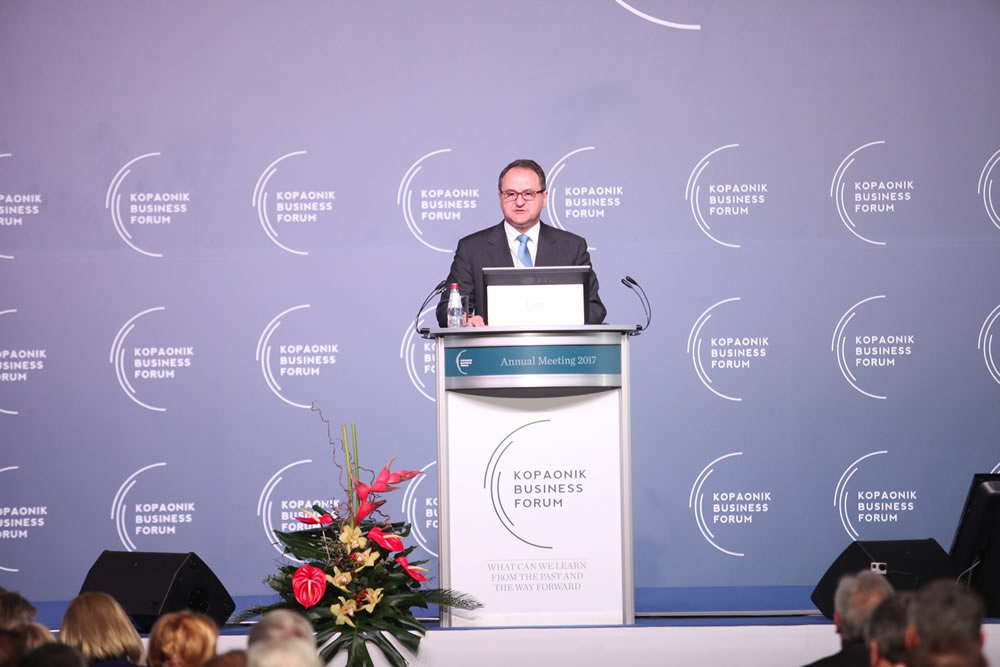
XXIV Kopaonik Business Forum was held from March 7th-9th 2017 at the Convention Center of the Grand Hotel in Kopaonik. The topic was Reform Agenda for Serbia: What can we learn from the past and the way forward. The Forum was attended by more than 1,140 participants, including eminent professors, government officials, members of the diplomatic corps, businessmen, domestic and foreign investors, and representatives of international financial organizations. It consisted of 20 panel discussions, three plenary sessions, four special events and two special presentations. The Forum was traditionally organized by the SAE and the Serbian Association of Corporate Directors, in partnership with Mastercard, which grants the organizers additional stability in raising the quality of this event. As in the previous years, the Forum was held under the patronage of the Serbian Prime Minister. Conclusions of the Forum will be summarized in the document titled “Kopaonik Consensus 2017” and presented to representatives of the Government of the Republic of Serbia, the National Bank of Serbia and other relevant institutions.
The first day of the Forum was reserved for intelligent investments as the Government’s new agility after fiscal consolidation, the second day was dedicated to the actualization of the reforms agenda: infrastructure development, public sector restructuring and smart growth, whereas topics of day three were sustainable and inclusive development and industrial policy perspective.
During this year’s Forum, agreement on the reform agenda was struck for the first time between Government representatives, the National Bank of Serbia, the business community and the international financial organizations. They all unequivocally agreed that fiscal consolidation has enabled a continuous strengthening of macroeconomic performances of Serbia over the last two years, that last years’ results were better than those in 2015, that growth amounted to 2.8%, state deficit was nearly two times lower than the expected 1.4%, that volume of industrial production increased by 4.7%, and of the manufacturing output by 5.3%. In addition to this, new approach in monetary policy ultimately brought about 1.6% year-on-year inflation in 2016, a steady exchange rate, lower interest rates, and the lowest level of nonperforming loans over the last six years.
The amount of foreign investments was positively influenced by macroeconomic stability, increased credit rating of Serbia, improved position of Serbia on comparative rating lists and the successfully completed sixth revision of the arrangement with the IMF. Foreign investments cover in full the deficit caused by ongoing payments. Stabilizing the foreign exchange rate and reducing external misbalance also contributed to foreign direct investments in 2016 amounting to EUR 1.8 billion.
The continued fiscal consolidation program brought an end to increase of public debt, which at the end of 2016 was approximately 74% GDP, which was by more than 2.5 percentage points less than in the previous year.
On the other hand, the previous year did not see the planned progress in the field of structural reforms, there were no reconstructions of large public enterprises, no completed privatizations of former social enterprises, and the regulatory framework for improving business of public utility companies still has not been defined clearly. Therefore, Serbia is yet to face deep reforms of the public administration, education, health, all public services and public enterprises.
During the Forum, significant attention was paid to the banking and insurance sectors, infrastructural projects, tax policy, trade and tourism, innovations, IT sector and the health system.
The Forum attracted great interest of the public. In addition to the statistical increase in the number of reports in domestic and regional media, this year’s Forum also recorded a significant increase in positive publicity. A poll conducted among the participants of the Forum confirmed its high quality and reputation among the professional circles.